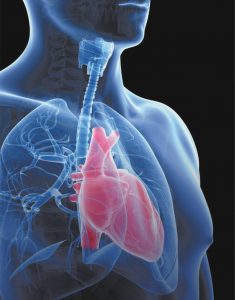By Dr. Aneley Yegezu Hundae, M.D., FACC
 Screening for coronary artery disease (CAD) is crucial for early detection and prevention of heart-related issues. During American Heart Awareness month, it becomes even more significant to shed light on the importance of identifying individuals who should undergo CAD screening and the methods employed in the process.
Screening for coronary artery disease (CAD) is crucial for early detection and prevention of heart-related issues. During American Heart Awareness month, it becomes even more significant to shed light on the importance of identifying individuals who should undergo CAD screening and the methods employed in the process.
Individuals with risk factors such as age, family history of heart disease, smoking, high blood pressure, high cholesterol, diabetes, and a sedentary lifestyle are prime candidates for CAD screening. Age plays a pivotal role, as the risk of CAD increases with advancing years. Family history provides valuable insights into genetic predispositions, while lifestyle factors contribute significantly to an individual’s overall cardiovascular health.
Medical professionals use a variety of methods to screen for CAD. Non-invasive tests like electrocardiograms (ECG or EKG) measure the heart’s electrical activity, identifying irregularities that could indicate CAD. Stress tests, which involve monitoring the heart’s response to physical activity, help uncover potential issues that may not be apparent at rest. Additionally, coronary calcium scoring, a specialized CT scan, measures the amount of calcium in the coronary arteries, providing an assessment of potential plaque buildup.
Furthermore, advanced imaging techniques such as coronary CT angiography (CCTA) or magnetic resonance angiography or magnetic resonance angiography (MRA) offer detailed pictures of the coronary arteries, aiding in the visualization of any blockages or abnormalities. Blood tests to measure cholesterol levels and inflammatory markers also play a crucial role in CAD screening.
During American Heart Awareness month, heightened efforts are made to raise awareness about CAD and the importance of early detection. Public health campaigns encourage individuals, especially those in high-risk categories, to undergo screenings and adopt heart-healthy lifestyles. Educational initiatives aim to inform the public about the risk factors associated with CAD, emphasizing the need for regular check-ups and preventive measures.
Primary care physicians often play a central role in identifying individuals who should be screened for CAD. Regular health check-ups enable healthcare providers to assess risk factors, recommend appropriate screenings, and provide guidance on lifestyle modifications. Patients with symptoms such as chest pain, shortness of breath, or palpitations may also be referred for CAD screening to rule out potential cardiac issues.
In addition to individual screenings, community-based initiatives during American Heart Awareness month often offer free or discounted CAD screenings. These events aim to reach a broader audience and make screening more accessible, particularly for those who may not regularly seek medical attention. Mobile health units and community clinics contribute to extending these services to underserved populations, addressing healthcare disparities in CAD detection.
In conclusion, screening for coronary artery disease is a vital component of cardiovascular health, and American Heart Awareness month serves as a timely reminder of its significance.
Identifying individuals at risk through a combination of risk factor assessment and various screening methods enables early intervention, potentially preventing adverse cardiac events. Collaborative efforts between healthcare providers, public health campaigns, and community initiatives contribute to creating a culture of proactive heart health, ultimately reducing the burden of CAD on individuals and society.
Dr. Aneley Yegezu Hundae, M.D., FACC
invasive cardiology and advanced heart failure management
Dr. Hundae received his Premedical and Doctor of Medicine Degree from Jimma University School of Medicine. He completed his Internal medicine Residency at Mercer University School of Medicine. His Heart Failure/Heart Transplant fellowship at the University of Miami Cardiovascular Fellowship Program. Cardiovascular fellowship at Baylor University Medical Center.
Board certifications
• Cardiology
• Advanced Heart Failure and Transplant
• Nuclear Cardiology
• Comprehensive Echocardiography
• Internal Medicine
3161 Harbor Blvd, Suite A, Port Charlotte, FL 33952
(941) 235-8892
www.portcharlottecardiology.com







